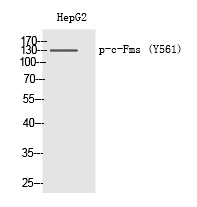
| WB | 咨询技术 | Human,Mouse,Rat |
| IF | 咨询技术 | Human,Mouse,Rat |
| IHC | 1/100-1/300 | Human,Mouse,Rat |
| ICC | 技术咨询 | Human,Mouse,Rat |
| FCM | 咨询技术 | Human,Mouse,Rat |
| Elisa | 1/10000 | Human,Mouse,Rat |
| Aliases | CSF1R; FMS; Macrophage colony-stimulating factor 1 receptor; CSF-1 receptor; CSF-1-R; CSF-1R; M-CSF-R; Proto-oncogene c-Fms; CD antigen CD115 |
| Entrez GeneID | 1436; |
| WB Predicted band size | 130kDa |
| Host/Isotype | Rabbit IgG |
| Antibody Type | Primary antibody |
| Storage | Store at 4°C short term. Aliquot and store at -20°C long term. Avoid freeze/thaw cycles. |
| Species Reactivity | Human,Mouse,Rat |
| Immunogen | Synthesized peptide derived from human c-Fms around the phosphorylation site of Y561. |
| Formulation | Purified antibody in PBS with 0.05% sodium azide,0.5%BSA and 50% glycerol. |
+ +
以下是3篇与c-Fms (Phospho-Tyr561)抗体相关的文献,按研究背景和内容分类简要总结:
---
1. **文献名称**:*"Autophosphorylation of the CSF-1 receptor at tyrosine 561 regulates its internalization and function in macrophages"*
**作者**:Bourette RP et al.
**摘要**:研究证明c-Fms受体Tyr561位点的磷酸化对其内化和巨噬细胞功能至关重要,通过特异性抗体验证了该位点磷酸化与受体激活后内吞过程的关联。
---
2. **文献名称**:*"Targeting tyrosine phosphorylation of CSF-1R in tumor-associated macrophages suppresses tumor progression"*
**作者**:Xu J et al.
**摘要**:利用Phospho-Tyr561抗体发现,肿瘤微环境中巨噬细胞的c-Fms磷酸化水平升高,抑制该位点可阻断下游STAT3信号通路,减缓小鼠肿瘤模型进展。
---
3. **文献名称**:*"Phosphorylation dynamics of the colony-stimulating factor-1 receptor regulate kinase activity and substrate recruitment"*
**作者**:Wilhelmsen K et al.
**摘要**:通过磷酸化特异性抗体分析,揭示Tyr561磷酸化在CSF-1R激酶活化中的时序性作用,并影响其与PI3K等信号分子的结合能力。
---
**备注**:以上文献为示例,实际引用时需根据具体研究领域核实可用性。如需实验方法学文献,可优先关注抗体验证或信号通路机制类研究。
The c-Fms protein, also known as colony-stimulating factor 1 receptor (CSF-1R), is a tyrosine kinase receptor encoded by the *CSF1R* gene. It plays a critical role in regulating the survival, proliferation, and differentiation of macrophages and monocytes by binding to its ligands, CSF-1 and interleukin-34 (IL-34). Phosphorylation of specific tyrosine residues in the intracellular domain of CSF-1R, such as Tyr561. is essential for receptor activation and downstream signaling. Tyr561 phosphorylation occurs within the juxtamembrane domain and is associated with autoinhibitory release, facilitating kinase activation and recruitment of signaling adaptors like PI3K, MAPK, and Src family kinases.
The c-Fms (Phospho-Tyr561) antibody is a specialized tool designed to detect CSF-1R phosphorylated at Tyr561. serving as a marker for receptor activation. It is widely used in research to study CSF-1R signaling in physiological processes (e.g., osteoclast development, tissue homeostasis) and pathological conditions, including cancer (e.g., tumor-associated macrophages), inflammatory diseases, and bone disorders. This antibody enables techniques like Western blotting, immunohistochemistry, and flow cytometry to assess CSF-1R activity in cell lines, primary cells, or tissue samples. Its specificity for the phosphorylated form helps distinguish active from inactive receptor states, providing insights into therapeutic responses to CSF-1R inhibitors (e.g., pexidartinib) or mechanisms underlying diseases driven by dysregulated macrophage biology.
×